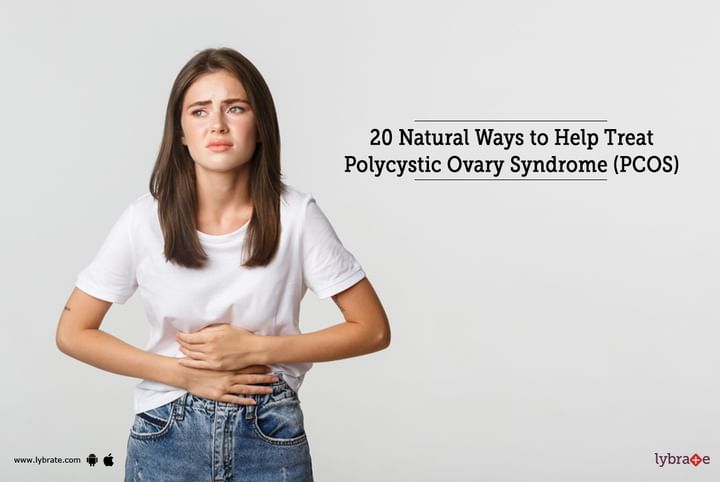Get the App
For Doctors
Login/Sign-up
Last Updated: Mar 14, 2023
BookMark
Report
20 Natural Ways to Help Treat Polycystic Ovary Syndrome (PCOS)
Dr. Baseerat KaurGynaecologist • 12 Years Exp.MBBS, MS, Fellowship in Minimal Access Surgery(FMAS), FELLOW IN ADVANCED GYNAE LAPAROSCOPY
What is Polycystic Ovary Syndrome (PCOS)?
PCOS, which stands for polycystic ovary syndrome, is a hormonal condition that primarily affects women of childbearing age.
It is characterised by a hormonal imbalance that leads to an excess of androgens, or male hormones, which can cause a variety of symptoms such as irregular menstrual cycles, acne, weight gain, excessive hair growth, and infertility.
What are the signs and symptoms of Polycystic Ovary Syndrome (PCOS)?
- Irregular menstrual cycles: PCOS causes irregular or infrequent periods and can lead to amenorrhea (the absence of menstrual periods).
- Excessive hair growth: Face, chest, abdomen, and upper-leg hair growth are all possible symptoms of polycystic ovary syndrome (PCOS) in women (hirsutism).
- Cysts on the ovaries: The presence of a large number of small cysts on the ovaries is diagnostic of this condition, which is brought on by a disruption in the normal levels of female hormones.
- Acne: Women with PCOS may experience acne due to increased levels of androgens (male hormones).
- Weight gain/obesity: Women with PCOS are more likely to become obese due to insulin resistance and increased levels of male hormones.
- Male-pattern baldness: Some women with PCOS may experience thinning hair or male-pattern baldness due to an increase in androgen hormones.
- Infertility: Due to erratic or absent ovulation, women who suffer from polycystic ovary syndrome (PCOS) may have trouble conceiving children (absence of ovulation).
What are possible complications of Polycystic Ovary Syndrome (PCOS)?
- Infertility: PCOS is one of the leading causes of infertility in women, as it can interfere with the ovulation process. This makes it difficult for a woman to conceive naturally.
- Unwanted Hair Growth: High levels of androgens (male hormones) can cause excessive hair growth on the face, chest, abdomen, and back in women with PCOS.
- Skin Problems: PCOS can cause skin problems such as acne, dark patches of skin (acanthosis nigricans), and skin tags.
- Mood Changes: Because of the hormonal imbalances that are associated with PCOS, women may experience higher levels of depression and anxiety than other women. [Citation needed]
- Sleep Apnea: Obesity is a common symptom of PCOS, which can lead to sleep apnea—a condition where you stop breathing during sleep because your airway is blocked or narrowed.
- Heart Disease Risk Factors: Having PCOS puts you at an increased risk for developing certain heart disease risk factors, such as high cholesterol and high blood pressure.
20 Natural Ways to Help Treat Polycystic Ovary Syndrome (PCOS)
- Exercise: By lowering androgen levels and improving insulin resistance, regular exercise can help reduce the risk of developing polycystic ovary syndrome (PCOS). Stress is reduced, and mood is improved, thanks in part to physical activity.
- Eat a Healthy Diet: Eating a diet that is high in fibre, low in sugar, and rich in fruits and vegetables can help reduce insulin levels, which can in turn help improve PCOS symptoms.
- Lose Weight: Weight loss can reduce insulin levels, which can improve PCOS symptoms.
- Reduce Stress: Stress can worsen PCOS symptoms, so reducing stress is important for managing the condition.
- Limit Caffeine: Caffeine can increase stress hormones, which can worsen PCOS symptoms.
- Take Herbal Remedies: Herbal remedies such as saw palmetto, vitex agnus-castus, chasteberry, and dong quai may help reduce PCOS symptoms by balancing hormones and improving insulin sensitivity.
- Avoid Alcohol: Alcohol consumption may worsen PCOS symptoms by increasing insulin levels and disrupting hormone balance.
- Take Supplements: Vitamin D supplements may help improve PCOS symptoms by increasing insulin sensitivity and reducing inflammation in the body. Zinc supplements may also be beneficial for women with PCOS since it helps balance hormones and improves ovulation rates in some women with the condition.
- Try Acupuncture: Acupuncture has been shown to be helpful for women with PCOS as it helps reduce stress, manage pain, regulate hormones, and improve fertility rates among other benefits related to the condition.
- Address Nutrient Deficiencies: Women with PCOS are often deficient in certain vitamins such as B vitamins or iron which can make managing the condition more difficult so addressing any deficiencies is important for treatment of the condition.
- Get Adequate Sleep: Getting sufficient quality sleep is important for managing stress levels which can worsen PCOS symptoms so ensuring you get enough restful sleep is essential for managing your condition.
- Monitor Blood Sugar Levels: Keeping track of your blood sugar levels is important for managing PCOS as high blood sugar levels are linked to increased risk of developing complications from the condition.
- Reduce Dairy Intake: Reducing dairy intake may help reduce inflammation caused by dairy products which can exacerbate existing inflammation caused by PCOS.
- Avoid sugar and processed food: Consuming sugary and processed food can aggravate PCOS symptoms.
- Ayurvedic medicines: Ayurvedic medicines like Chandraprabha Vati, Kanchanar Guggulu, Dashmoolarishta etc can help in treating PCOS symptoms like irregular periods and acne.
- Reduce stress levels: Stress can worsen the symptoms of PCOS, so it is important to reduce stress levels through meditation or yoga practices.
- Dietary changes: Eating a diet that is composed of whole grains, fruits, vegetables, and proteins that are low in fat can assist in maintaining hormonal equilibrium and reducing inflammation.
- Herbal supplements: Certain herbs such as ashwagandha, shatavari, and amalaki are known to have beneficial effects on hormone levels and may help reduce the symptoms of PCOS.
- Ayurvedic massage: Ayurvedic massage with herbal oils is known to reduce stress levels and improve circulation which can help regulate hormones in PCOS patients.
- Fasting: Intermittent fasting has been shown to be beneficial in people with PCOS as it helps to improve insulin sensitivity and reduce the symptoms of PCOS.
Which surgical treatments Treat Polycystic Ovary Syndrome (PCOS)?
- Ovarian Drilling: PCOS can be treated with this operation, which only requires a small amount of surgical incisions.It involves the insertion of a needle or thin instrument into the ovary to destroy some of the ovarian tissue. This helps decrease androgen levels in the body, which can improve ovulation and fertility.
- Laparoscopic Surgery: This is a more invasive surgical procedure used to treat PCOS. A very small incision is made in the patient's abdomen so that a thin, lighted tube known as a laparoscope can be inserted into the patient's abdominal cavity during laparoscopic surgery.The surgeon can look inside and make any necessary repairs or remove any abnormal tissue or cysts on the ovaries or fallopian tubes that may be causing symptoms of PCOS.
- Hysterectomy: During a hysterectomy, the uterus and, in some cases, additional reproductive organs like the ovaries, fallopian tubes, and cervix are removed surgically. This procedure is referred to as a hysterectomy.It can be used to treat PCOS if other treatments haven't been successful in managing symptoms or if there are other medical concerns present that warrant removal of these organs.
Best doctors to consult for Treatment of Polycystic Ovary Syndrome (PCOS)?
- Endocrinologist: An endocrinologist is a doctor who specialises in hormones and the endocrine system and is the best type of doctor to see for PCOS. They will be able to prescribe medications that can help restore hormone levels and regulate your menstrual cycle. Additionally, they will be able to provide dietary advice and lifestyle guidance that can help manage symptoms of PCOS.
- Gynecologist: Gynaecologists are another type of doctor who specialise in the health of female reproductive organs and are qualified to provide medical attention to women who suffer from PCOS.They may recommend hormonal birth control or other medications that can help manage symptoms, as well as recommend alternative treatments such as acupuncture or yoga.
- Reproductive Endocrinologist: A reproductive endocrinologist is a specialist in reproductive medicine who has additional training in endocrinology. This type of doctor is best suited for women who are interested in conceiving, as they are experts in fertility treatments such as in-vitro fertilisation (IVF). They may also be able to provide more comprehensive care for PCOS than a traditional gynaecologist or endocrinologist, depending on the individual’s needs.
In case you have a concern or query you can always consult a specialist & get answers to your questions!



+1.svg)
